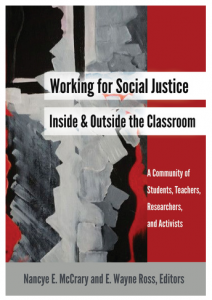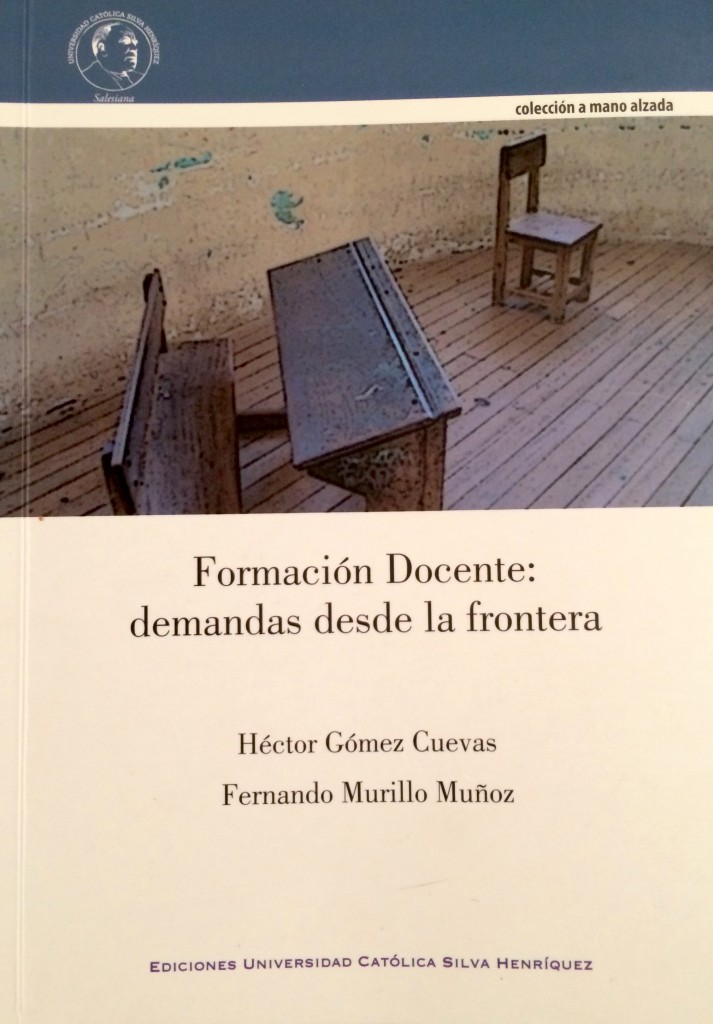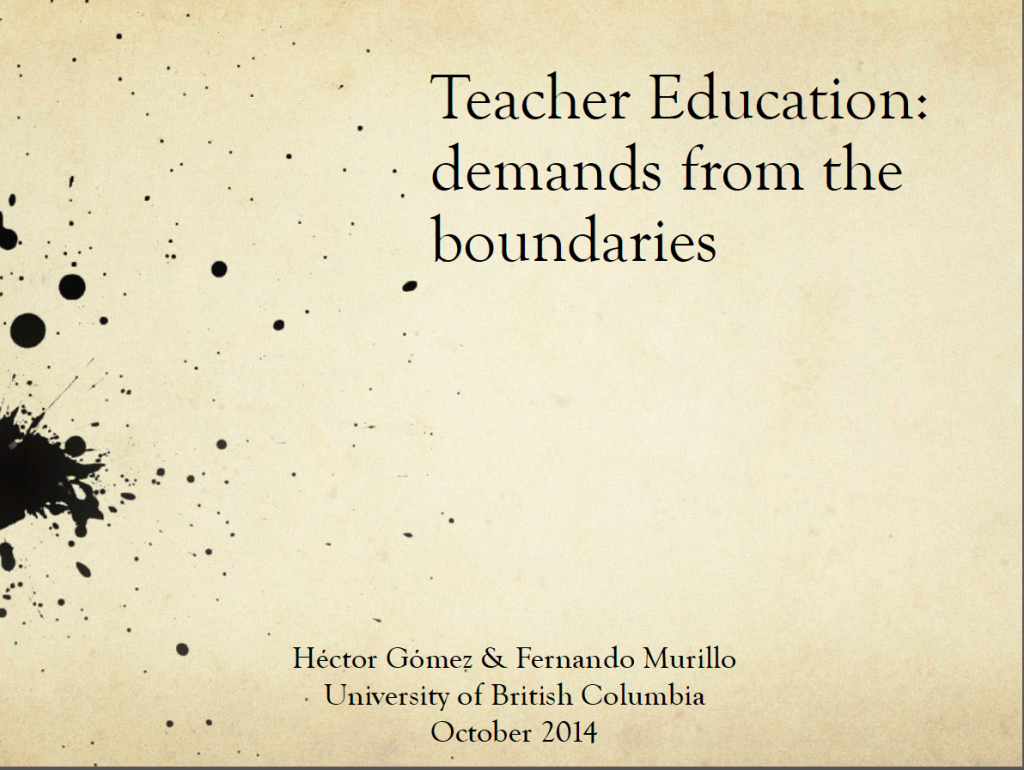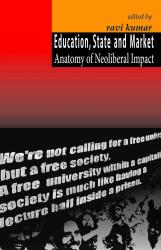Ron Evans has written an impressive series of books that critically examine school reform in the United States, with a specific emphasis on the impact of those reforms on social studies, civics, and democratic education.
In January 2015, I had an opportunity to interview Ron about his latest book Schooling for Corporate Citizens and this month, in Washington, DC, the College and University Faculty Assembly of National Council for the Social Studies sponsored a symposium on the book, below is the text of my remarks at the symposium.
Remarks for Book Symposium on Schooling Corporate Citizens (Ronald W. Evans)
College and University Faculty Assembly of National Council for the Social Studies
Washington, DC
December 1, 2016
E. Wayne Ross
University of British Columbia
Why are things the way they are?
In Schooling Corporate Citizens, Ron Evans has written a compelling history of how bureaucratic, outcomes-based accountability reforms have “damaged” civic education and undermined democracy. Evans notes that social studies education is haunted by two ghosts, the first neoliberal capitalism and neo-conservative cultural warriors and secondly the progressive politics, philosophy, and pedagogy of 20th Century icons such as John Dewey and Harold Rugg.
Evans argues the dilemmas that define social studies at the moment are found (1) in classroom practice (drill and kill/content coverage, driven by testing versus inquiry- or social issues-oriented teaching); and (2) in curriculum politics, which encompasses the social studies wars, but more broadly has elevated a capitalist social efficiency conception of teaching and learning to hegemonic status in combination with an essentialist philosophy of education that focuses on content at the expense of pedagogy.
I agree with Evan’s analysis, but as Chris Hedges recently wrote about the election of Donald Trump as president of the US, “it’s worse than you think.” Evan’s book is an indispensable history of what has happened to social studies and civic education from the inside-out, but stepping away from the history of education reform and considering a much broader, messier, but real life question about relationship between what is taught in social studies and the political, social, economic, and cultural circumstances of the US (and the world) today, then it’s clear that in terms of social studies and civic education things are obviously much worse than the already dismal state of social studies as described in Schooling Corporate Citizens.
Perhaps it’s a professionally narcissistic question that implies too much import to what we do as social studies educators, but when he majority of people either actively or passively support destructive systems of power—white supremacy, capitalism, patriarchy—we should be asking: What hath social studies wrought?
Mass ignorance. In explaining how it is that the Republican Party now rules a nation that hates it, Paul Street points to the “supreme ignorance that the nation’s dominant ideological and cultural authorities and institutions have bred in much of the U.S. populace.” The “double-whammy” of “infantilizing and unreal media” and the education students receive in capital’s schools that creates “millions of dumb-downed people” who know little to nothing about relevant issues of the day, like climate change or the nature and history of fascism. Hedges describes of the current cultural moment as celebrating ignorance—political discourse, news, culture and intellectual inquiry replaced by celebrity worship and spectacle. And social studies and civic education is far from blameless for this sorry state of affairs.
The distortion of democracy, or how democracy is taught in schools versus the really existing form of governance in so-called democracies. As research by Gilens and Page demonstrates the United States not a functioning democracy, rather it is a plutocracy. As social studies educators we need to stop teaching a mythic democracy and start teaching the real everyday political realities. Gilens and Page provide the empirical evidence that illustrates average citizens and mass-based interest groups have little or no independent influence on what their government does.
In our illiberal democracy (or what has been called inverted totalitarianism) the people, the electorate, are prevented from having a significant impact on policies adopted by the state. Our governing system has elections, yes, but citizens are cut off from knowledge about the activities of those who exercise real power as a result of lack of civil liberties and a massive publications/propaganda machine that includes highly concentrated media corporations that project the illusion of a free press.
Authentic political participation can be found – look at movements like Black Lives Matter and Standing Rock – but the version of democracy long taught in most social studies classes is a victim of political cleansing. As Sheldon Wolin argues, US electoral democracy is now a “political form in which governments are legitimated by elections they have learned to control.”
As Huxley wrote in Brave New World, the old forms remain – elections, supreme courts, parliaments and all the rest, but the underlying substance is a new kind of totalitarianism.
All the traditional names, all the hollowed slogans will remain exactly what they were in the good old days. Democracy and freedom will be the theme of every broadcast and editorial. Meanwhile the ruling oligarchy of soldiers, policemen, thought-manufacturers and mind-manipulators will quietly run the show as they see fit.
Corporations have corrupted and subverted democracy – capitalism trumps politics – every natural resource and every living being is commodified and exploited to death as the citizenry is lulled and manipulated into surrendering their civil liberties and their participation in government is reduced to excessive consumerism and sensationalism.
There are two main totalizing dynamics in the US, according to Wolin, (1) the war on terror; and (2) neoliberal, free-market, economics, which subjects the population to economic rationationalization (e.g., downsizing, outsourcing, dismantling of the welfare state) destroying the commons and creating a sense of helplessness and hopelessness that makes it even less likely people will engage politically, thus perpetuating the vicious cycle of illiberal democracy. All the while social studies continues to teach faith in the system, nostalgically looking back to the past, unthinkingly maintaining a corrupt system while stuck in the mire of the unholy apocalypse that is now.
Disconnection between what the people want and reality of everyday life. As Street argues in his book They Rule: The 1% v. Democracy, Washington runs on corporate and financial cash, connections, reach, and propaganda, not public opinion. The “unelected dictatorship of money” is not interested in crafting policy that responds to public opinion polls that show:
- Two-thirds (66%) of Americans think that the distribution of money and wealth should be more evenly distributed among more people in the U.S.
- 61% of Americans believe that in today’s economy it is mainly just a few people at the top who have a chance to get ahead.
- 83% of Americans think the gap between the rich and the poor is a problem.
- 67% of Americans think the gap between the rich and the poor needs to be addressed immediately, not as some point in the future.
- 57% of Americans think the U.S. government should do more to reduce the gap between the rich and the poor in the U.S.
- Almost three-quarters (74%) of respondents say that large corporations have too much influence in the county, about the double the amount that said the same of unions.
- 68% of Americans favor raising taxes on people earning more than $1 million per year.
- 50% of Americans support limits on money earned by top executives at large corporations. (Street, 2015)
The disconnect between public opinion and reality of government’s (non) responses to inequality and injustice and its attacks on civil rights, is a direct challenge to our work as social studies educators. We can no longer rely on the old tropes of democracy and freedom that have dominated the curriculum and classroom discourse; to do so to sell students a lies about history and contemporary life.
Obedience. Why are things as they are? Part of the answer, a big part of the answer is consent, we’ve let things become this way. We need to learn, practice, and teach disobedience, in the name of social justice, in the name of trying to achieve the visions of democracy that are so often glibly taught in social studies classrooms.
In an open letter posted on Susan Ohanian’s website by Omaha lawyer, Rob Bligh writes:
I think that I understand the political malice that guides the Republicans. I think that I understand the political correctness that guides the Democrats. I think that I understand the arrogant ignorance that guides the Gates crowd.
What I do not understand is the deafening silence of nearly all … teacher-training faculty employed by America’s colleges and universities. They are allowing their graduates to be roasted slowly over a flame of lies and they are doing nothing about it. Perhaps the professors think that they will escape to early retirement before Gates and the politicians come for them. Some profession!
Ohanian herself writes, in an article that amounts to a call to arms for critical educators titled “Against Obedience,”
When teachers stoically keep their silence while corporate politicos shovel shit on them, they really can’t expect that tomorrow they’ll get roses. Or even less shit. I’m thinking of getting cards printed so I can distribute this message: You deserve what you accept. We can see the stages of teacher reaction to Common Core Standards: Denial, Anger, Bargaining, Depression … But please, please, we need to skip ‘Acceptance’ and move to resistance. Real resistance, not just Twitter/Facebook/blog complaint.
Whining is not the same thing as doing something. Whining is whining. Action is something else. …. Not to resist is to become what you do. …. There are no excuses left. Either you join the revolution or you stand against the needs of children, and you aid the destruction of your own profession, not to mention democracy.
We MUST build a mass movement. Revolution is the only answer.
Believing in and teaching faith in the system is a fool’s errand for anyone claims to claims to be working for democracy, justice, and equality given present circumstances – a world plagued by climate change, species extinction, imperial war, and systematic violence against women, people of color, and the poor, and the rise of 21st Century fascism. If as social studies educators we are serious about working for democracy, then our work requires practicing and teaching disobedience and resistance, which would be an about-face for the field. The old tropes of democracy have failed us as social studies educators and have failed the public. Here’s a workout plan for anyone who’s ready to challenge totalitarianism:
Start with a warm up: protests, strikes, and public events. Push your boundaries and find out what your skills are. Then comes the cardio: organizing, the long distance running of the movement. Weight training is composed of civil disobedience and low-level hit-and-run techniques, gaining experience with each strike. Finally comes the competition itself: the revolutionary confrontations, sabotage, undermining, hacking, and other actions necessary for dismantling empire. (Max Wilbert, Counterpunch, 2016)
No magical thinking. Warming our own and our students’ hearts with myths of democracy is a dangerous practice. In the immediate aftermath of the 2016 election, Chris Hedges warned that societies in terminal decline often retreat into magical thinking. The reality is just too much to bear so people are susceptible to “fantastic and impossible promises of a demagogue or charlatan who promises the return of a lost golden age.”
These promises, impossible to achieve, are no different from those peddled to Native Americans in the 1880s by the self-styled religious prophet Wovoka [aka Jack Wilson]. He called on followers to carry out five-day dance ceremonies called the Ghost Dance. Native Americans donned shirts they were told protected them from bullets. They were assured that the buffalo herds would return, the dead warriors and chiefs would rise from the earth and the white men would disappear. None of his promises was realized. Many of his followers were gunned down like sheep by the U.S. army.
We need a revolution in our thinking and the courage to act in politically and pedagogically in revolutionary ways to build mass democratic movements to combat totalitarianism. We must not allow social studies to become a ghost dance of democracy … or perhaps we already have.



